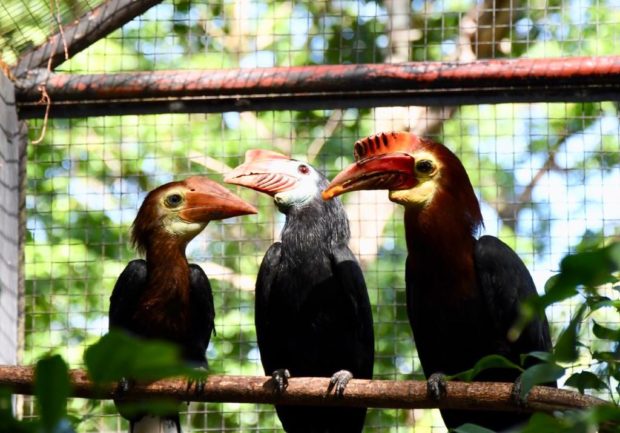Conservationists welcome birth of endangered bird chick in Negros Occidental
BACOLOD CITY — Wildlife conservationists in Negros Occidental hailed the recent birth of a critically endangered Walden’s Hornbill (Rhabdotorrhinus waldeni), locally known as Talarak, at the Negros Forest Park, South Road Capitol Road in this city.
The Walden’s Hornbill chick has been named “Valentin” because it was first heard making a sound from within a tree where it was sealed with its mother on Valentine’s Day, said Paul Lizares, vice president of Talarak Foundation Inc. (TFI), which manages Negros Forest Park, formerly known as the Negros Forest and Ecological Foundation Inc. Biodiversity Conservation Center.
Valentin’s parents, Ligaya and Kalantiaw, were born in the wild, he added.
When the female Walden’s Hornbill lays her eggs, she is sealed in the trunk of a tree for about 105 days to incubate the eggs and later take off the chicks. She can only leave when her chicks are ready to fledge.
In the meantime, she relies on the male Walden’s Hornbill to bring her food every single day. If the male is poached or hunted, the whole family dies.
Article continues after this advertisementThe Walden’s Hornbill, also known as the Visayan Wrinkled Hornbill, Rufous-headed Hornbill or the Writhed-Billed Hornbill, is now near extinct.
Article continues after this advertisement“They are functionally extinct in Negros, and there have only been a few sightings and calls heard, but no photographic proof, so far,” said Fernando Gutierrez, TFI president.
The Walden’s Hornbill was used to be seen in the forests of Negros and Panay islands.
“It took us nine years to have our first ever successful breeding. They take so long to mature, and bonded pairs are hard to form in captivity. Pairs have to be totally compatible to breed successfully,” Gutierrez said.
At the Negros Forest Park, Valentin’s mother, Ligaya, sealed herself last Jan. 4, and after a week, she laid her first egg.
She laid a total of three eggs but only one was hatched, Lizares said.
Ligaya was sealed inside the nest until April 19, or for 105 days, he said, adding that the gender of Valentin would be known after a month or two.
Valentin is female if the feathers start molting in a month or two. The bird turns out to be male if it maintains the same feather coloration.
The last successful captive breeding of a Walden’s Hornbill was in 2010, at the Mari-it Conservation Center, in Lambunao town in Iloilo.
Since then, captive numbers have plateaued at a mere 32, with one female having a congenital defect. Only Mari-it and Negros Forest Park have these birds in captivity and are working hard to keep this species alive.
Hunting for sport, poaching for the illegal wildlife trade, and the lack of mature nesting trees in our forests, are key factors to their rapid decline in numbers.
“Being big birds, with poaching and hunting still an issue in our remaining forests, the future looks very bleak if there are any wild birds remaining. It is of great importance to properly secure our remaining forest cover,” Gutierrez said.
NFP’s head keeper, Jimmy Benzuela, did not take a single day off in the 105 days that Ligaya was sealed in.
He tirelessly watched over the new family, ensuring that their health and nutrition was everyone’s top priority.
“Being one of the zookeepers, I have much joy and pride, that for the first time I was able to successfully hatch a Rufous Headed Hornbill. Every breeding season I really give them extra time and effort just so they can breed, and for the longest time waiting, I was actually able to get them to breed successfully. My joy is full,” he said.
NFP’s Curator David Castor said he was so happy to see the beautiful young Walden.
“It is a feeling of achieving a breakthrough, a new height in our conservation and breeding program,” he said.
